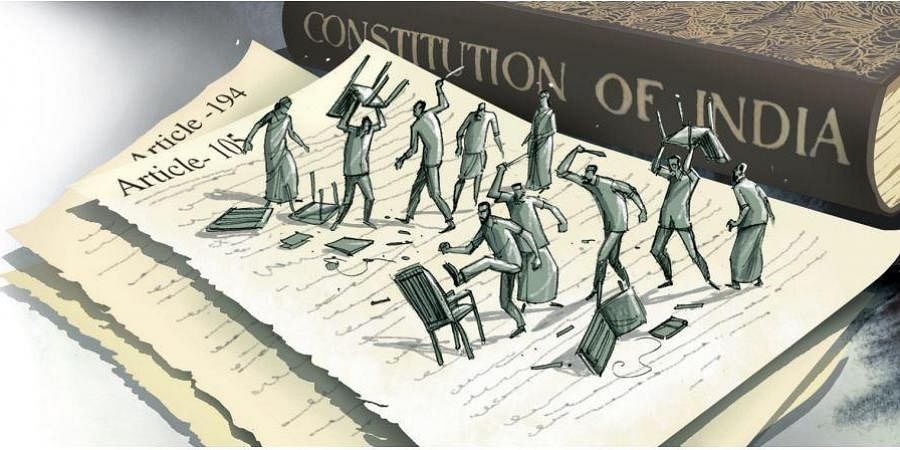Parliamentary privileges are essential rights and immunities granted to members of Parliament (MPs) in India, enabling them to perform their duties without undue interference. These privileges, enshrined in Articles 105 and 194 of the Constitution, are designed to uphold the integrity and independence of legislative proceedings. However, recent events have highlighted a concerning decline in legislative decorum, raising questions about balance between privilege and responsibility.
Understanding Parliamentary Privileges
Parliamentary privileges are special rights, immunities and exemptions enjoyed by members of Parliament and their committees. These are essential for members to discharge their duties without interference or intimidation. Sources include the Constitution, parliamentary conventions, laws, rules of both houses and judicial interpretations. The key purpose is to ensure disciplined and undisturbed functioning of Parliament. However, these are not absolute rights and are subject to limitations and responsible use.
Constitutional Provisions:
- Article 105: Provides privileges of Parliament, including freedom of speech in Parliament and immunity from court proceedings for statements or votes in Parliament.
- Article 122: States that the validity of proceedings cannot be questioned in court.
- Article 194: Extends similar privileges to State Legislature members.
- Article 212: Protects State Legislature proceedings from judicial intervention.
It’s noteworthy that these privileges don’t extend to the President, despite being part of Parliament.

Classification of Parliamentary Privileges:
- Individual Privileges:
- Freedom of speech in Parliament.
- Immunity from court proceedings for parliamentary actions.
- Freedom from arrest in civil cases (40 days before and after a session).
- Exemption from jury service during parliamentary sessions.
- Collective Privileges:
- Right to receive information about a member’s arrest or detention.
- Protection of proceedings publication.
- Right to exclude strangers from proceedings.
- Right to punish for breach of privileges.
- Control over internal proceedings.
- Immunity from arrest within House precincts without the Speaker’s permission.
Historical Context of Legislative Decorum
India’s parliamentary history boasts leaders who exemplified political civility and respect for legislative processes. Figures like Jawaharlal Nehru, who treated young parliamentarians with courtesy and P.V. Narasimha Rao, who entrusted opposition leaders with significant responsibilities, set high standards for parliamentary conduct. Debates were characterised by intellectual rigour, with parliamentarians like Ram Manohar Lohia and Atal Bihari Vajpayee engaging in constructive discourse.
Recent Decline in Parliamentary Decorum
In contrast, recent sessions have witnessed disruptions from both opposition and treasury benches. Incidents include duelling demonstrations by MPs, leading to accusations of assault and injury. The Speaker of the Lok Sabha has had to suspend opposition members, effectively “denuding” the House of opposition during critical bill passages. Such disruptions have resulted in more adjournments than discussions, with a noticeable decline in meaningful debate. The government’s utilisation of Parliament as a mere “noticeboard” for announcements, coupled with a breakdown of trust between the government and opposition, has further exacerbated the situation.
Challenges and Issues
The current scenario presents several challenges:
- Scope Determination: Balancing privilege protection against accountability remains complex.
- Potential Misuse: There’s a risk of privileges being exploited for personal or political gain.
- Transparency Concerns: Opaque enforcement mechanisms hinder public trust.
- Conflict with Constitutional Principles: Ensuring equality before the law while granting special privileges poses inherent contradictions.
These challenges underscore the need for better oversight and enforcement mechanisms to maintain the sanctity of parliamentary proceedings.
International Practices
Examining international practices offers valuable insights:
- United Kingdom: The Parliament at Westminster enjoys privileges like freedom of speech, immunity from arrest, and the right to regulate its own proceedings, established through a combination of statute, common law and precedent.
- Canada: The Parliament of Canada has similar privileges outlined in the Constitution Act, 1867, and the Parliament of Canada Act.
- Australia: The Parliament of Australia follows similar principles, with privileges enshrined in its Constitution.
- New Zealand: The Parliamentary Privilege Act 2014 provides a clear framework for privileges.
These examples highlight the global recognition of parliamentary privileges as essential for legislative independence, while also emphasizing the importance of clear frameworks to prevent misuse.
Recent Developments
Recent incidents have further highlighted the erosion of legislative decorum in India:
- Impeachment Motion Against the Vice President: In December 2024, Indian opposition parties moved to impeach Vice President Jagdeep Dhankhar, accusing him of partisanship in his role as chairman of Parliament’s upper house. This unprecedented move underscores the deepening rift between the government and opposition.
- Physical Altercations Among MPs: There have been reports of physical altercations involving members of Parliament from both the ruling and opposition parties, further diminishing the sanctity of parliamentary proceedings.
The erosion of parliamentary decorum and the misuse of privileges have compromised the legislature’s primary function as a deliberative body.
Related Articles:



